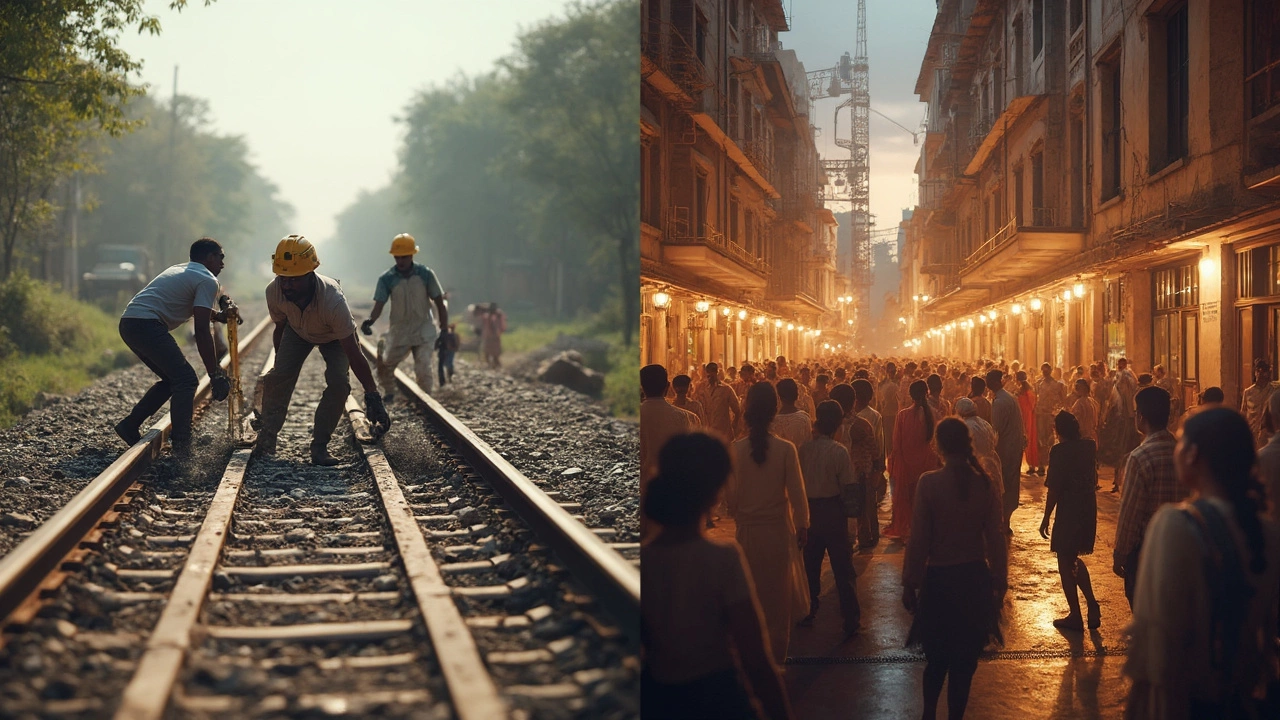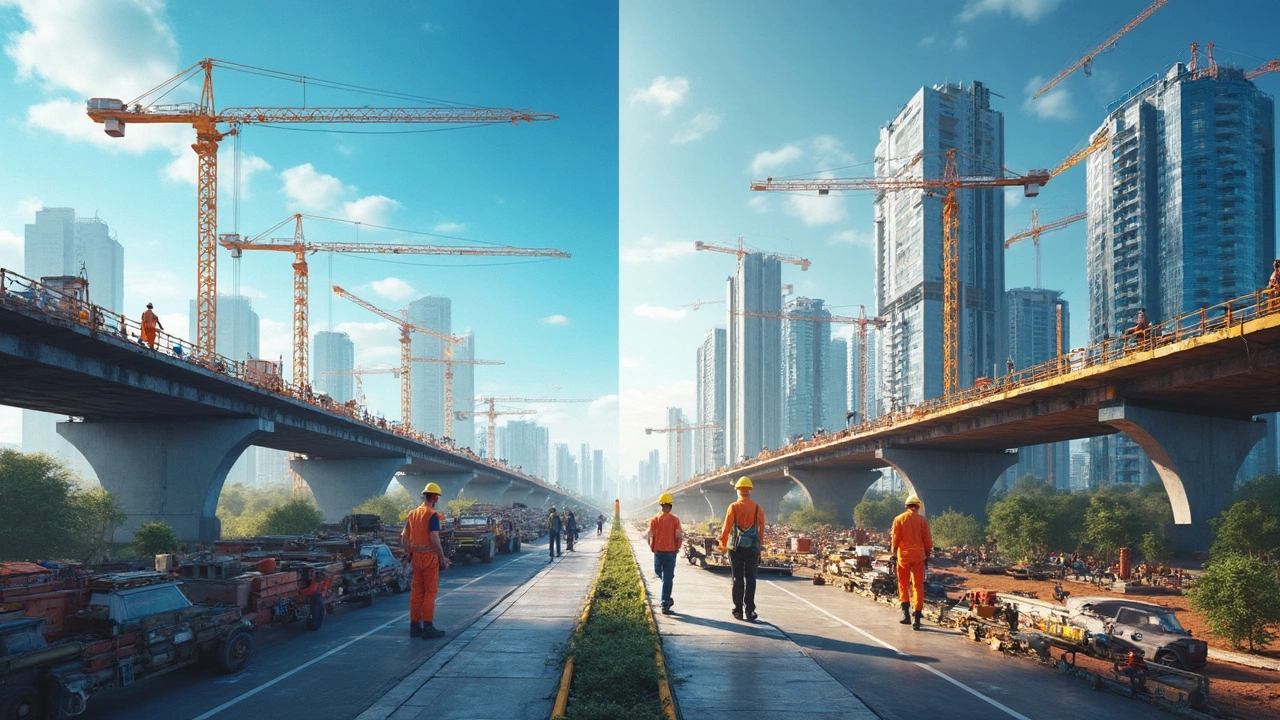Most people lump all construction together, but not every building project is created equal. Ever wondered why you hire a certain type of company for a highway but a totally different team for a shopping mall? That’s because civil and commercial construction are two different animals, each with its own playbook.
If you’ve got a project in mind—maybe an office upgrade or a new warehouse—you’ve probably come across these terms. Knowing what they mean can save you time, money, and a whole lot of headaches. Let’s break it all down so you can spot the difference right away—and know exactly what skills and experience to look for in your builder.
- Defining Civil and Commercial Construction
- Project Types: Who Builds What?
- Key Rules and Regulations
- The Skills and Teams Involved
- What To Consider Before Choosing a Contractor
Defining Civil and Commercial Construction
Let’s get these terms straight because they mean very different things on a job site. Commercial construction covers buildings made for business—the kinds of places where people shop, eat, go to work, or get services. Think grocery stores, offices, hotels, shopping centers, and restaurants. If the building has something to do with making or spending money, it’s commercial.
Civil construction, on the other hand, is all about infrastructure. This means roads, bridges, dams, airports, water treatment plants, and just about anything else that keeps cities and communities running. If it’s something you drive on, get water from, or rely on for public use, chances are it comes from a civil construction crew.
Even though both types use similar basic materials—steel, concrete, glass—the rules, goals, and skills are different. While commercial projects focus on tenants, customers, and daily business life, civil projects serve the public and usually get paid for by taxpayers.
Check out the table below showing the main differences at a glance:
| Type | Main Focus | Common Examples | Funding |
|---|---|---|---|
| Commercial Construction | Business Buildings | Office Towers, Retail Stores, Warehouses, Hotels | Private Companies/Investors |
| Civil Construction | Infrastructure | Highways, Bridges, Water Treatment Plants, Airports | Government/Public Money |
Here’s a fast tip: If your project involves shops, offices, or anything commercial-facing, you’ll want a team that knows the unique codes, timelines, and design needs of the business world. If you’re dealing with anything that’ll be owned by the government or used by everyone—like utilities or transportation—look for experience in the civil sector.
Project Types: Who Builds What?
This is where things really start to separate. Civil and commercial construction each tackle a totally different set of projects. Civil construction is all about the stuff that keeps cities and towns running: roads, bridges, tunnels, airports, dams, water treatment plants, railways—if it’s owned by the public and you can’t buy a burger there, it’s probably civil. Take your morning commute, for example. The overpass you drive on or the subway you ride—that’s civil work in action.
Commercial construction, on the other hand, is focused on private or business property. Think office buildings, shopping centers, hotels, warehouses, restaurants, hospitals, and schools. Basically, when a company is planning to make money or offer a service from a new building, commercial builders jump in. Even some apartment complexes fall under the commercial category if they’re large and built for business reasons rather than small-time rentals.
Here’s a quick cheat sheet:
- Civil construction: Highways, public parks, water treatment plants, airports, power plants, rail systems, bridges.
- Commercial construction: Office towers, retail stores, hotels, parking garages, restaurants, warehouses, hospitals, large apartment buildings.
Why does this matter? Different projects mean different requirements—and totally different expert teams. If a city needs a new wastewater plant, they’re not calling the same folks who build shopping malls. The tools, materials, safety codes, and even weatherproofing techniques can change depending on what’s getting built. It’s all about matching the right builder to the right job, so things get done safely and up to code.

Key Rules and Regulations
Whether you’re dealing with a busy city street or a shiny new strip mall, the rules for civil and commercial construction projects look pretty different. Civil construction—think highways, bridges, or water treatment plants—has to meet strict government standards since public safety is on the line. Commercial projects (like offices and stores) still follow tough rules, but they’re tailored more for keeping the building safe for visitors and workers.
Civil projects need to jump through a ton of local, state, and even federal hoops. Agencies like the Department of Transportation and the Environmental Protection Agency set standards for everything from stormwater runoff to how traffic is managed around the site. You also see a lot more oversight and inspections, with little wiggle room for shortcuts.
Commercial projects typically report to city authorities—such as local building departments and fire marshals. You'll need to stick to zoning laws, accessible design codes (like ADA), and energy efficiency rules. During COVID-19, most states added emergency health requirements to construction sites, with ongoing updates now part of many codes.
Here’s a quick breakdown of the big regulators and what they look for:
- Civil: Department of Transportation (DOT), Environmental Protection Agency (EPA), U.S. Army Corps of Engineers
- Commercial: City or County Building Division, Fire Department, Occupational Safety and Health Administration (OSHA)
| Type | Main Regulator | Key Permits/Standards |
|---|---|---|
| Civil | DOT, EPA, Army Corps | Highway/bridge codes, environmental reviews, utility relocation, public right-of-way |
| Commercial | City permit office, OSHA | Zoning, ADA, fire codes, energy efficiency, workplace safety |
Tip: Always check which permits are needed before you start—missing paperwork can shut your project down for weeks.
The Skills and Teams Involved
If you've ever walked past a construction site and wondered who does what, here's the scoop: the teams for commercial construction projects and civil jobs look pretty different. Commercial sites (think: malls, warehouses, office buildings) usually bring together architects, structural engineers, project managers, electricians, plumbers, HVAC technicians, safety inspectors, and a swath of skilled trades workers. Civil projects (like highways, bridges, and water treatment plants) need their own set of experts—civil engineers, environmental specialists, heavy equipment operators, concrete finishers, and surveyors.
Project managers are the nerve center for both types. But in civil jobs, they often handle bigger, longer projects that need coordination with government agencies and lots of documentation. Commercial jobs tend to move faster and involve more subcontractors working in tight spaces and on strict deadlines.
Here's how the makeup of a typical team compares between the two:
| Role | Civil Construction | Commercial Construction |
|---|---|---|
| Project Manager | Yes | Yes |
| Civil Engineer | Always | Rarely |
| Structural Engineer | As needed | Always |
| Surveyor | Always | Sometimes |
| Heavy Equipment Operator | Always | Sometimes |
| Architect | Rarely | Always |
| Electrician/Plumber/HVAC | Sometimes | Always |
| Environmental Specialist | Often | Rarely |
Quick fact: The U.S. Bureau of Labor Statistics says the construction industry needs over 300,000 new workers every year just to keep up. This includes all roles, but the real shortage is in skilled trades and experienced site managers—especially in the commercial sector.
If you're hiring or planning a build, ask your contractor about their core crew and the experience they bring. A commercial project often benefits from pros who've worked on similar-sized jobs before, while civil work demands people who can handle massive equipment and government paperwork. It really pays to match the right skills to the right project.

What To Consider Before Choosing a Contractor
Picking the right team for your project isn’t just about gut feelings or the slickest website. There are some real deal-breakers and red flags you need to watch for—especially in commercial construction where the stakes are high. If you want your new building to open on time and under budget, here’s where to start.
- Experience in Your Project Type: Not all contractors handle every type of build. Ask for proof of past jobs that match what you want—like office build-outs, retail centers, or industrial spaces. Photos, references, or even a quick drive by past projects can tell you a lot.
- Licenses and Certifications: Don’t just take their word for it. Every legit contractor should have the right state licenses and up-to-date insurance. For commercial jobs, you might also want to see OSHA certifications or memberships in trade groups like the Associated General Contractors of America.
- Safety Record: Construction is risky work. Ask about their safety ratings and policies. Contractors with high accident rates usually end up costing more, delay projects, or get shut down by safety inspectors.
- Financial Health: A solid contractor should be able to share proof they’re financially stable. If money’s tight on their end, your project can stall or get hit with surprise lien claims from unpaid suppliers.
- Transparent Bidding and Timeline: Watch for vague bids. Make sure you get clear schedules and a breakdown of costs. It’s normal to get at least three quotes before making a decision.
Check out this quick comparison of what matters most for civil versus commercial jobs, so you know what details to dig into when interviewing contractors:
| Factor | Civil Construction | Commercial Construction |
|---|---|---|
| Project size | Often massive (bridges, highways) | Varies (small cafes to huge malls) |
| Required permits | Usually run by government agencies | City, county, and state permits |
| Stakeholders | Public sectors, taxpayers | Private companies, investors |
| Complexity | Environmental rules, massive crews | Zoning, accessibility, safety codes |
One last tip—always get your contract in writing before anyone starts swinging a hammer. Lay out payment terms, dispute solutions, and who handles what if delays hit. This step alone can save you a boatload of stress down the road.
